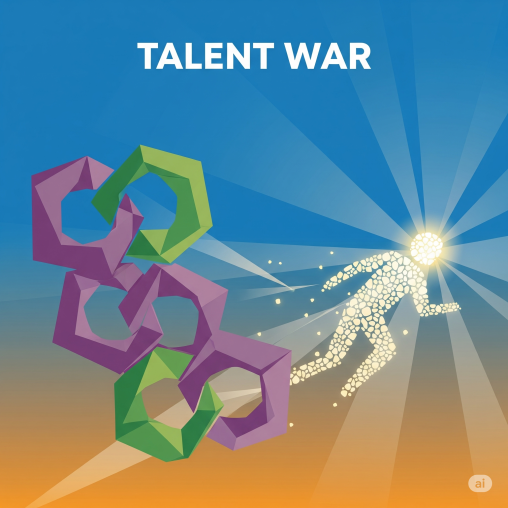In today’s dynamic global economy, businesses are grappling with a challenge as critical as market volatility or technological disruption: the fierce talent war. Companies across industries are struggling not just to attract, but crucially, to retain skilled talent. This escalating competition for human capital, driven by persistent labor shortages and a seismic shift in employee expectations, is forcing organizations to fundamentally rethink their talent strategies.
Gone are the days when a competitive salary alone secured top performers. Today’s workforce, particularly the emerging generations, seeks more than just compensation. They demand flexibility, opportunities for growth, purpose-driven work, and a supportive culture. This evolving landscape necessitates a proactive and adaptive approach to workforce development that extends far beyond traditional recruitment.
The Shifting Sands of Employee Expectations
The COVID-19 pandemic acted as a powerful catalyst, accelerating pre-existing trends in employee preferences. The widespread adoption of remote work demonstrated the viability of flexible models, empowering employees to seek work-life balance and autonomy. This shift has cemented the demand for:
- Flexible Work Models: Hybrid, remote, and flexible hour arrangements are no longer perks but often baseline expectations. Companies that insist on rigid, in-office attendance risk alienating a significant portion of the talent pool.
- Purpose and Impact: Modern employees, especially younger generations, are increasingly driven by a desire for their work to have meaning and contribute positively to society.
- Continuous Learning and Development: The rapid pace of technological change means skills obsolescence is a constant threat. Employees expect their employers to invest in their growth, providing avenues for continuous learning and career advancement.
- Well-being and Mental Health Support: A holistic approach to employee well-being, encompassing mental health resources, stress management, and a supportive work environment, is now a critical differentiator.
Upskilling and Reskilling: The Cornerstone of Resilience
In an era defined by rapid technological advancement (including AI, as we’ve discussed), the shelf life of many skills is shrinking. This makes upskilling (enhancing existing skills) and reskilling (learning entirely new skills) not just beneficial, but essential for both individual career longevity and organizational competitiveness.
Companies that prioritize comprehensive upskilling and reskilling programs are not only building a more agile and future-ready workforce but also demonstrating a tangible commitment to their employees’ long-term success. This fosters loyalty and reduces costly turnover. Practical approaches include:
- Internal Training Academies: Dedicated platforms or programs for continuous learning aligned with business needs.
- Tuition Reimbursement & Certifications: Supporting employees in pursuing external courses, degrees, or industry certifications.
- Mentorship and Coaching: Leveraging experienced personnel to guide and develop emerging talent.
- Cross-Functional Projects: Providing opportunities for employees to gain exposure to different areas of the business and develop new skill sets.
Attracting and Retaining Talent in a Competitive Landscape
To win the talent war, businesses must move beyond reactive hiring and embrace a strategic, proactive approach:
- Strengthen Your Employer Brand: Cultivate a compelling narrative about your company culture, values, and the unique opportunities you offer. Highlight your commitment to employee development, diversity, equity, and inclusion.
- Rethink Recruitment Strategies: Broaden your sourcing channels beyond traditional job boards. Explore professional networks, social media, and even consider non-traditional backgrounds that can bring fresh perspectives.
- Invest in Candidate Experience: A smooth, transparent, and respectful application and interview process is crucial. First impressions matter, and a poor candidate experience can deter top talent.
- Prioritize Onboarding Excellence: A structured and supportive onboarding process helps new hires integrate quickly, understand their roles, and feel valued from day one.
- Foster a Culture of Growth and Recognition: Regularly provide feedback, recognize achievements, and offer clear pathways for career progression. An environment that encourages continuous learning and innovation will naturally attract and retain ambitious individuals.
- Embrace Data-Driven HR: Utilize analytics to understand employee engagement, identify retention risks, and measure the effectiveness of workforce development initiatives.
The talent war is not a temporary skirmish; it’s the new reality of the business landscape. Companies that strategically invest in their workforce through continuous development, embrace flexible work models, and foster a culture of growth and well-being will be the ones that not only attract the best and brightest but also build a resilient, innovative, and ultimately, successful future.
Discover more from Nexus
Subscribe to get the latest posts sent to your email.

mjkkl